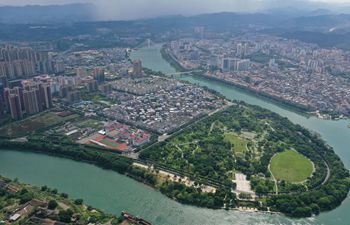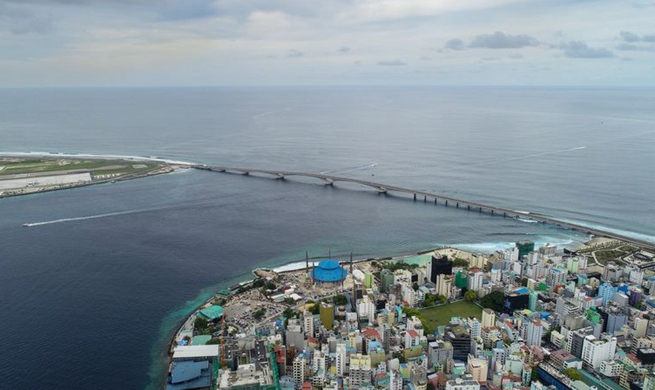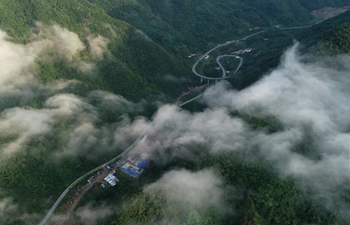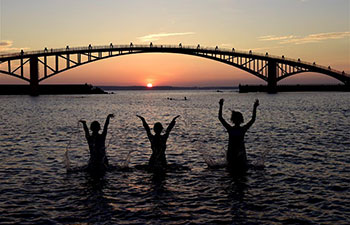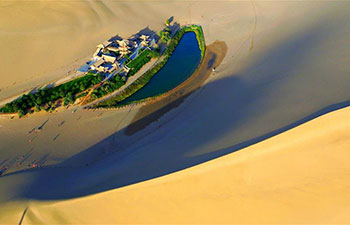By Maria Spiliopoulou, Valentini Anagnostopoulou
ATHENS, Aug. 30 (Xinhua) -- Greece steps up efforts to reduce fatalities in swimming pools, beaches and water sport accidents lately, experts told Xinhua in recent interviews in Athens, following a long series of incidents reported nationwide this summer.
On average 400 people lose their lives across Greece in recent years annually, according to Greek Coast Guard and Greek National Public Health Organization data.
Although a maritime nation, Greece ranks 6th among EU member states in the percentage of deaths by drowning per populace, according to Eurostat figures. In 2016 it stood at 2.5 percent per 100,000 people, while the EU average was 1.1.
"Unfortunately, Greece leads in the number of fatalities per year at sea. Certainly, a factor is that Greece receives great numbers of tourists. Not all victims are Greeks, but many tourists visiting the country obviously do not know swimming or what they should be careful of," Panagiotis Paschalakis, founder and President of Safe Water Sports, explained.
The NGO was founded in 2015 after the fatal injury of his son Michael, aged 10, in the summer of 2014 in a beach on Mykonos island.
Paschalakis launched the initiative aiming to raise public awareness on safety issues in the water and help in accident prevention.
Earlier this week he was received by Greek Prime Minister Kyriakos Mitsotakis to discuss actions to strengthen the safety framework in the country.
"I think that a few first steps have been made over the past four years. Undoubtedly there is much more to be done, but we have altered legislation and now we are heading towards the second round. More changes in the legal framework should be done so we can improve our record," Paschalakis told Xinhua.
"Imagine that in 2015 the 80 percent of (water sports) businesses in the country were operating with no proper licenses and were not inspected. Today, the 90 percent are licensed," he said.
"Until 2015, there were on average 1,000-1,500 inspections made at beaches with lifeguards, water sports facilities and businesses for recreational activities. Today we have reached 15,000 controls. Imagine that in 2015 there were no educational programs for children at schools," he said.
Currently, approximately 40,000 children every year are informed on basic safety rules in the water.
On its part, Safe Water Sports has so far provided the Coast Guard with an integrated control and inspection information system which allows authorities to manage online, real time all licenses that authorize water sports rental agencies in Greece, monitor the presence of lifeguards at beaches, violations and so on.
The NGO has also created a Compliance Control and Quality Mark Private Protocol for water sports rental agencies regarding safety and runs an extensive educations program to inform students at schools, camps and sports facilities throughout the country on the dangers lurking at sea and swimming pools.
Moreover, Safe Waters Sports has developed a mobile phone application and website available for free in Greek and English providing useful information on safety features across 3,100 beaches (whether the waters are deep or shallow, if there is a lifeguard, whether it is accessible to people with special needs.
Through the platform the users can report to authorities any kind of misconduct or illegal activity at sea that may put public safety in danger.
Information, education and a stricter legislative framework are the keys to success, for Paschalakis.
He suggests that training on dangers while swimming or participating in water sports should become a compulsory course at schools.
He urges for the amendment of legislation to extend lifeguards' presence on popular beaches each day.
Nikos Giovanides, Director of the Hellenic Life Saving Academy, also welcomes the progress steps achieved lately, pressing for more policies and urgent action to save more lives.
A new law for lifeguards which came into force last year has already helped to improve the statistics, he told Xinhua, calling for more bold policies to strengthen safety on beaches and swimming pools.
The amended law foresees the compulsory recruitment of lifeguards at beaches attracting at least 300 swimmers on a day. Until last year the minimum was 500 people.
The presence of lifeguards at crowded beaches is now compulsory for four months (from June 1 to September 30) instead of three and each lifeguard checks coast area within 200 meters either side of the rescue tower, instead of 300 meters in the past.
The new law also requires all coastal municipalities to provide a patrol- rescue vessel with a professional lifeguard and the necessary equipment to offer aid, such as portable defibrillators.
"On sites where the presence of professionals (lifeguards) is mandatory under the new legislative framework, drownings have decreased impressively. I can tell you that on beaches where there are lifeguards from 10:30 a.m to 17:30 p.m, there are no fatalities," Giovanides said.
"We need to see what we should do regarding swimming pools," he added, explaining that the legislative framework for pools is different, as well as the dangers. In this category the number of deaths has not declined.
"Most victims are minors and the elderly in our country, according to the statistics at our disposal so far," the expert stressed.
